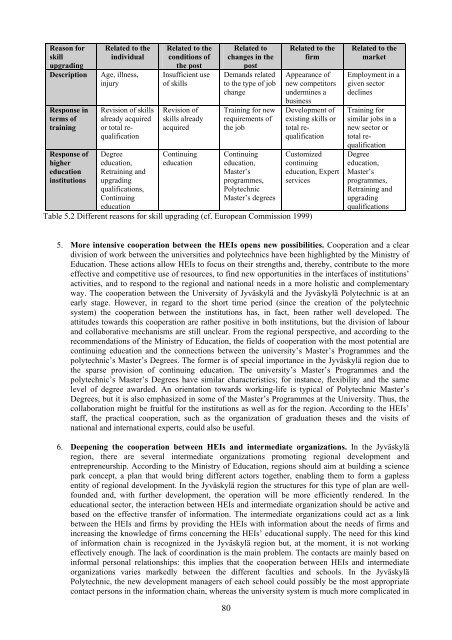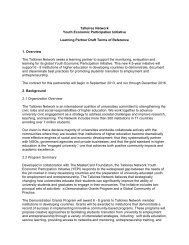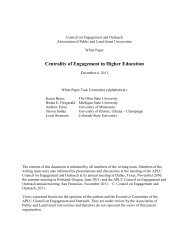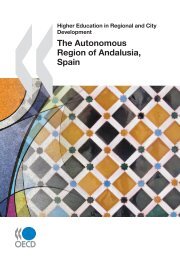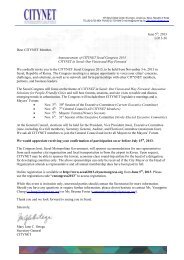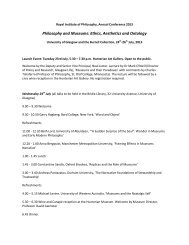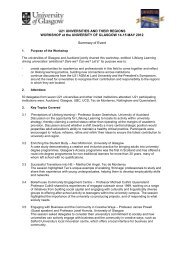3. Work based learning combines education and working life. The development of the system thatpromotes the workplace training of HEI students is considered to be very important by the HEIs andfirms in the Jyväskylä region. The practical training (e.g., working in a firm or participating inproject activities) forms an integrated part of the study programmes of the Jyväskylä Polytechnic,whereas at the University of Jyväskylä, the training period is optional. The Integration of highereducation learning in the workplaces is one way to promote the regional employment prospects ofstudents and stimulate firms’ awareness of the educational and research opportunities offered byHEIs. The adoption and efficient utilization of the more coordinated system of on-the-job learningrequires new ways of thinking and new kinds of cooperation from both the educational institutions(staff and students) and the workplaces involved. Vocational institutions in Central <strong>Finland</strong> provide agood example of the well-functioning system of work based learning. Apprenticeship training invocational institutions means that the education provider, the employer, and the employee enter intoa fixed-term employment agreement about the training; this takes place alongside work. Theworking-life periods of the vocational institutions’ teachers are a part of their work assignment. Thegraduation theses done by HEI students in cooperation with firms and other regional organizationsare of equal importance to work-based learning, and they should not be seen as separate componentsbut, rather, as connected parts that support each other. The importance of graduation theses inpromoting regional development varies between and within the HEIs in the Jyväskylä region. Thepotential of international HE-students, as a part of the regional labour force, should also be promotedby enabling them to create contacts with the firms and to get work experience.4. Responding to increasing needs of life-long learning. The rapid growth and content renewal ofknow-how and professional requirements, the ageing of the work force, differences in education andtraining between generations, and the growing number of the retirement-age population, necessitatethat the education policy is weighted towards lifelong learning. The need for the revision of skills, oreven total re-qualification, can appear for different reasons. It may be related to the individual,changes in the job/position, to the firm, or the market. Adult education in <strong>Finland</strong> is arranged byuniversities and polytechnics, public and private vocational institutions, adult education centres andsummer universities, adult upper-secondary schools, study centres, sports institutes, and musicinstitutes. The University of Jyväskylä aims at responding to the challenges of academicentrepreneurship and maintaining the high-level knowledge base of industry and other aspects ofeconomic life. The Open University and Continuing Education Centre are the main units providingtertiary level adult education in the Jyväskylä region. However, their regional orientation is not verystrong. The Master’s Programmes organized by their faculties also provide a flexible way tocontinue earlier studies to the advanced degree level. In turn, the Jyväskylä Polytechnic focuses onthe working-life oriented educational needs of firms, particularly those of small- and medium-sizedfirms. The different forms of polytechnic education aiming at life-long learning include professionalspecialization studies, retraining and upgrading qualifications, and Master’s Degrees. The life-longlearning possibilities in the higher education sector are diverse in the Jyväskylä region, but the mainproblem is the lack of systematic coordination and the resulting scattered provision of education.Table 5.2 represents different reasons related to the need for updating individual skills. The last rowsuggests the responses of HEIs.79
Reason forskillupgradingDescriptionResponse interms oftrainingResponse ofhighereducationinstitutionsRelated to theindividualAge, illness,injuryRevision of skillsalready acquiredor total requalificationDegreeeducation,Retraining andupgradingqualifications,ContinuingeducationRelated to theconditions ofthe postInsufficient useof skillsRevision ofskills alreadyacquiredContinuingeducationRelated tochanges in thepostDemands relatedto the type of jobchangeTraining for newrequirements ofthe jobContinuingeducation,Master’sprogrammes,PolytechnicMaster’s degreesRelated to thefirmAppearance ofnew competitorsundermines abusinessDevelopment ofexisting skills ortotal requalificationCustomizedcontinuingeducation, ExpertservicesTable 5.2 Different reasons for skill upgrading (cf. European Commission 1999)Related to themarketEmployment in agiven sectordeclinesTraining forsimilar jobs in anew sector ortotal requalificationDegreeeducation,Master’sprogrammes,Retraining andupgradingqualifications5. More intensive cooperation between the HEIs opens new possibilities. Cooperation and a cleardivision of work between the universities and polytechnics have been highlighted by the Ministry ofEducation. These actions allow HEIs to focus on their strengths and, thereby, contribute to the moreeffective and competitive use of resources, to find new opportunities in the interfaces of institutions’activities, and to respond to the regional and national needs in a more holistic and complementaryway. The cooperation between the University of Jyväskylä and the Jyväskylä Polytechnic is at anearly stage. However, in regard to the short time period (since the creation of the polytechnicsystem) the cooperation between the institutions has, in fact, been rather well developed. Theattitudes towards this cooperation are rather positive in both institutions, but the division of labourand collaborative mechanisms are still unclear. From the regional perspective, and according to therecommendations of the Ministry of Education, the fields of cooperation with the most potential arecontinuing education and the connections between the university’s Master’s Programmes and thepolytechnic’s Master’s Degrees. The former is of special importance in the Jyväskylä region due tothe sparse provision of continuing education. The university’s Master’s Programmes and thepolytechnic’s Master’s Degrees have similar characteristics; for instance, flexibility and the samelevel of degree awarded. An orientation towards working-life is typical of Polytechnic Master’sDegrees, but it is also emphasized in some of the Master’s Programmes at the University. Thus, thecollaboration might be fruitful for the institutions as well as for the region. According to the HEIs’staff, the practical cooperation, such as the organization of graduation theses and the visits ofnational and international experts, could also be useful.6. Deepening the cooperation between HEIs and intermediate organizations. In the Jyväskyläregion, there are several intermediate organizations promoting regional development andentrepreneurship. According to the Ministry of Education, regions should aim at building a sciencepark concept, a plan that would bring different actors together, enabling them to form a gaplessentity of regional development. In the Jyväskylä region the structures for this type of plan are wellfoundedand, with further development, the operation will be more efficiently rendered. In theeducational sector, the interaction between HEIs and intermediate organization should be active andbased on the effective transfer of information. The intermediate organizations could act as a linkbetween the HEIs and firms by providing the HEIs with information about the needs of firms andincreasing the knowledge of firms concerning the HEIs’ educational supply. The need for this kindof information chain is recognized in the Jyväskylä region but, at the moment, it is not workingeffectively enough. The lack of coordination is the main problem. The contacts are mainly based oninformal personal relationships: this implies that the cooperation between HEIs and intermediateorganizations varies markedly between the different faculties and schools. In the JyväskyläPolytechnic, the new development managers of each school could possibly be the most appropriatecontact persons in the information chain, whereas the university system is much more complicated in80
- Page 1 and 2:
OECD/IMHE ‐ Supporting thecontrib
- Page 3 and 4:
SUMMARYTogether with 13 other regio
- Page 5 and 6:
8.2 Increasing the regional effecti
- Page 7 and 8:
I INTRODUCTION1.1 Strengthening the
- Page 9 and 10:
development. The aim is that region
- Page 11 and 12:
The self-evaluation considered here
- Page 13 and 14:
densely populated cities in Finland
- Page 15 and 16:
1,9 %1,7 %1,5 %1,3 %Population chan
- Page 17 and 18:
The share of jobs in primary produc
- Page 19 and 20:
New pillars of future’s developme
- Page 21 and 22:
Jyväskylä0,60,91,11,0Central Finl
- Page 23 and 24:
2.4 Governance StructureMunicipalit
- Page 25 and 26:
of its development outside the cent
- Page 27 and 28:
III CHARACTERISTICS OF THE HIGHER E
- Page 29 and 30: continuing education and open unive
- Page 31 and 32: The Science and Technology Policy C
- Page 33 and 34: 3.2 Regional dimension within the n
- Page 35 and 36: order to respond to the challenges
- Page 37 and 38: 14001200Master's degreesDoctoratesN
- Page 39 and 40: 900800Youth graduatedAdult graduate
- Page 41 and 42: provide information for the basis o
- Page 43 and 44: CabinetParliamentSTPCSteering (andf
- Page 45 and 46: 5,04,0Billion euros3,02,01,00,083 8
- Page 47 and 48: The number of refereed articles is
- Page 49 and 50: Centre of expertisePaper industryBi
- Page 51 and 52: The Institute for Environmental Res
- Page 53 and 54: and systematic gradually progressin
- Page 55 and 56: are seen to be very important chann
- Page 57 and 58: Internal support units of HEIsThe F
- Page 59 and 60: of interviewed HEI staffs, the coop
- Page 61 and 62: areas of the region’s Centre of E
- Page 63 and 64: system of Jyväskylä and the HEIs
- Page 65 and 66: V CONTRIBUTION OF TEACHING AND LEAR
- Page 67 and 68: esources to establish new activitie
- Page 69 and 70: The main problem for the Finnish la
- Page 71 and 72: longer. 2.5% of the Jyväskylä Pol
- Page 73 and 74: activities. As a part of the new qu
- Page 75 and 76: education programmes consisting of
- Page 77 and 78: the TE-Centre of Central Finland an
- Page 79: practices in the provision of educa
- Page 83 and 84: Strengths+ HEIs are actively confro
- Page 85 and 86: taxation, to lower the unemployment
- Page 87 and 88: Box 6.2 The WIRE -projects: Support
- Page 89 and 90: indoor ice-skating rink, the Rauhal
- Page 91 and 92: The School of Cultural Studies at t
- Page 93 and 94: the number of registered customers
- Page 95 and 96: Box 6.9 Environmental management in
- Page 97 and 98: Strengths+ The significance of HEIs
- Page 99 and 100: eferring to the regional developmen
- Page 101 and 102: Key topics relating to changes in t
- Page 103 and 104: participation in the decision makin
- Page 105 and 106: in the strategy-making process. The
- Page 107 and 108: 7.5 Critical points in promoting th
- Page 109 and 110: 7.Cooperation in strategies concern
- Page 111 and 112: egion is according to national and
- Page 113 and 114: oundaries for further developmental
- Page 115 and 116: joining resources and operations by
- Page 117 and 118: Discussion proposal 15: To ensure d
- Page 119 and 120: achieved by the horizontal utilizat
- Page 121 and 122: Appendix 2 Information on data used
- Page 123 and 124: and finding synergy between the oth
- Page 125 and 126: School of BusinessRoleThe School of
- Page 127 and 128: The challenge of the school from re
- Page 129 and 130: developing wellness and environment
- Page 131 and 132:
Faculty of EducationRoleThe Faculty
- Page 133 and 134:
and/or graduation thesis is a signi
- Page 135 and 136:
Areas of strength and prioritising
- Page 137 and 138:
Agora Center’s partners from the
- Page 139 and 140:
Currently the priority of ITRI’s
- Page 141 and 142:
Weak spots and areas to develop in
- Page 143 and 144:
Employment and Economic Development
- Page 145 and 146:
Appendix 3 Analysis of the most sig
- Page 147 and 148:
Appendix 4 Regional effects (input-
- Page 149 and 150:
The overall value of production cre
- Page 151 and 152:
Appendix 5 Reform of regional struc
- Page 153 and 154:
Appendix 7 Provision of education i
- Page 155 and 156:
Appendix 8 Statistical information
- Page 157 and 158:
Appendix 10 Statistics on financing
- Page 159 and 160:
Appendix 12 Labour market activity
- Page 161 and 162:
Appendix 14 Master’s Programmes a
- Page 163 and 164:
Uusiutuvan energian tutkimusohjelma
- Page 165 and 166:
BIBLIOGRAPHYAcademy of Finland (200


